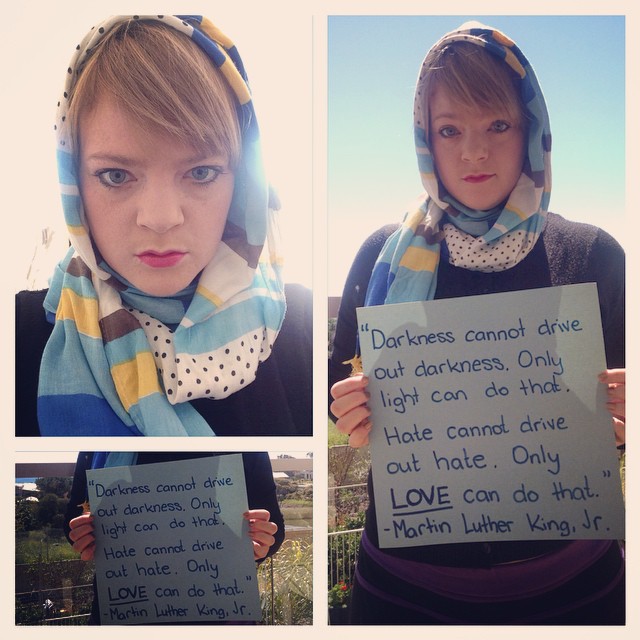As Australia continues to debate the banning of the burqa, Christians are engaged in a debate of their own on the headwear of Muslim women.
When 27-year-old Christian Kate Leaney began to receive messages from her Muslim friends saying they were scared wearing their hijabs in public, she decided something needed to be done.
Kate, who manages The Welcome Centre in Adelaide and is an active member of pentecostal church, Activate, decided to spend a week wearing a hijab, a Muslim headscarf covering the hair and neck.

Kate in a headscarf
She said it was to “stand in solidarity with people tainted by a brush of hatred they do not deserve.” Her display garnered national news coverage: the Christian girl wearing a Muslim head covering.
But other Christians are perplexed by the action.
In a hard-hitting critique of the display on his blog this week, conservative Christian blogger Bill Muehlenberg said the Kate’s action, and others like it, were an “unhelpful and unbiblical compromise.”
“They may all well have good intentions, but good intentions alone are never enough. Our intentions should always line up with the Word of God, and not be mere emotional reactions, or a misplaced sense of compassion, or a worldly understanding of tolerance,” Muehlenberg wrote.
“Now, are Christians to love Muslims, or atheists or Satanists or cultists for that matter? Absolutely. But of course you don’t love them by defending their false worldview, by telling them they are just fine as they are, and by pretending that their beliefs are no better or worse than your beliefs. That is called syncretism and compromise, and that is how we destroy the gospel of Jesus Christ.”
Kate doesn’t accept Bill Muehlenberg’s criticism. She believes she’s doing what Jesus would have done. She quotes Matthew 25:40, “Whatever you did for one of the least of these, brothers and sisters of mine, you did for me”.
“I think about where Jesus would be in a situation like this. And I think he’d be standing with the persecuted and working with those bearing the brunt of this persecution. Wearing the hijab isn’t an open display of my Christian faith, but everything I do is influenced by Jesus. I feel like I am where Jesus would be.”
Kate is now part of a Facebook community called ‘WISH – Women in Solidarity with Hijabis’ (#WISH) that now has over 20,000 followers. Created by Muslim women overwhelmed by the support they were receiving from many in the community, the page encourages women to take a selfie while wearing a hijab.
Even within the Muslim community there is debate over the #WISH campaign. Some have written of whether donning a hijab for a seflie serves only as another form of social media ‘slacktivism’, reducing wearing the hijab to “an act of dress-up rather than a deeply personal and spiritually significant decision” (Zeynab Gamieldien for Daily Life).
Kate says she didn’t wear the hijab as a social experiment and she believes the #WISH campaign is only a first step.
“A week wearing a hijab doesn’t make it in any way possible to understand the complexities of life as a Muslim woman,” she stresses.
“It’s so much more than putting a piece of fabric on our heads. It’s saying that no matter what’s going on and what our media is saying, I stand with you as a person, as an individual, not a stereotype. But conversation and relationships with Muslim women … getting to know them personally, is what’s going to make the difference.”
Kate wore her hijab for a week. Muslims and Christians have been living in the same communities for a lot longer. The real task for Christians is how to balance truth telling and love as Christian expert on Muslims Mark Durie points out in his Eternity article in late September, Muslims need truth and love.
Email This Story
Why not send this to a friend?

